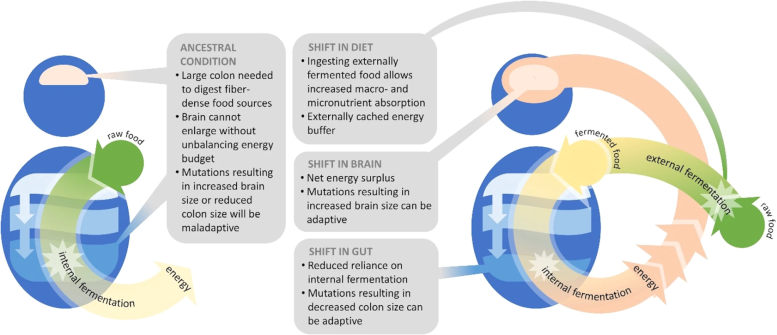The research study assumes that ‘pre-digested’ foods added to the advancement of bigger brains.
The big, capable human brain is a marvel of development, however how it progressed from a smaller sized primate brain into the innovative, complicated organ these days is a secret. Researchers can identify when our evolutionary forefathers progressed bigger brains, which approximately tripled in size as human forefathers progressed from the bipedal primates called Australopithecines.
However why it occurred when it did — what stimulated that modification– has actually stayed evasive. While some have actually thought that making use of fire, and the subsequent creation of cooking, provided our forefathers enough nutrition for our larger-brained forefathers to end up being dominant, a brand-new theory indicate a various stimulate: fermentation.
The Function of Diet Plan in Brain Advancement
The essential to comprehending how our brains grew is probably rooted in what– and how– we consume, stated Erin Hecht, among the authors of the research study which was just recently released in Nature Communications Biology.
” Brain tissue is metabolically pricey,” stated the Human Evolutionary Biology assistant teacher. “It needs a great deal of calories to keep it running, and in a lot of animals, having enough energy simply to make it through is a consistent issue.” For larger-brained Australopiths to make it through, for that reason, something should have altered in their diet plan. Theories advanced have actually consisted of modifications in what these human forefathers taken in or, a lot of widely, that the discovery of cooking enabled them to gather more functional calories from whatever they consumed.
However the issue with this theory is that the earliest proof puts making use of fire at around 1.5 million years earlier– considerably behind the advancement of the hominid brain. “Our forefathers’ cranial capability started increasing 2.5 million years earlier, which conservatively offers us about a 1-million-year space in the timeline in between brain size increasing and the possible introduction of cooking innovation,” described Katherine L. Bryant, among the paper’s co-authors and presently a scientist at the Institute for Language, Interaction, and the Brain at Aix-Marseille Université in France. “Some other dietary modification should have been launching metabolic restraints on brain size, and fermentation looks like it might fit the costs.”
Included Hecht: “Whatever altered in their diet plans needed to have actually taken place before brains began growing.”
Fermentation: A New Viewpoint on Brain Development
She continued, keeping in mind that throughout the last couple of years, scientists have actually postulated other choices, such as the intake of decomposing meat. In this brand-new paper, Hecht and her group use a various hypothesis: that cached (or conserved) food fermented, which this “pre-digested” food offered a more available kind of nutrition, sustaining that larger brain and permitting our larger-brained forefathers to make it through and prosper through natural choice.
The shift was most likely a delighted mishap. “This was not always a deliberate venture,” Hecht posited. “It might have been an unexpected adverse effects of caching food. And perhaps, with time, customs or superstitious notions might have resulted in practices that promoted fermentation or made fermentation more steady or more dependable.”
This hypothesis is supported by the reality that the human big intestinal tract is proportionally smaller sized than that of other primates, recommending that we adjusted to food that was currently broken down by the chemical procedure of fermentation. In addition, fermented foods are discovered in all cultures and throughout food groups, from Europe’s red wine and cheese to Asia’s soy sauce and natto, or soybeans.
Hecht recommended that an extra research study of brain reactions to fermented and non-fermented foods may be helpful, as may among olfactory and taste receptors, possibly utilizing ancient DNA For the evolutionary biologist, these are all fertile locations for other scientists to detect. (Hecht’s focus is more on “how brain circuits have actually progressed to support complicated habits” with research study on both living human beings and pets.)
As research study advances, Bryant sees possibilities for a vast array of advantages. “This hypothesis likewise offers us as researchers much more factors to check out the function of fermented foods on human health and the upkeep of a healthy gut microbiome,” she stated. “There have actually been a variety of research studies recently connecting gut microbiome to not just physical however psychological health.”
Referral: “Fermentation innovation as a motorist of human brain growth” by Katherine L. Bryant, Christi Hansen and Erin E. Hecht, 23 November 2023, Communications Biology
DOI: 10.1038/ s42003-023-05517-3
